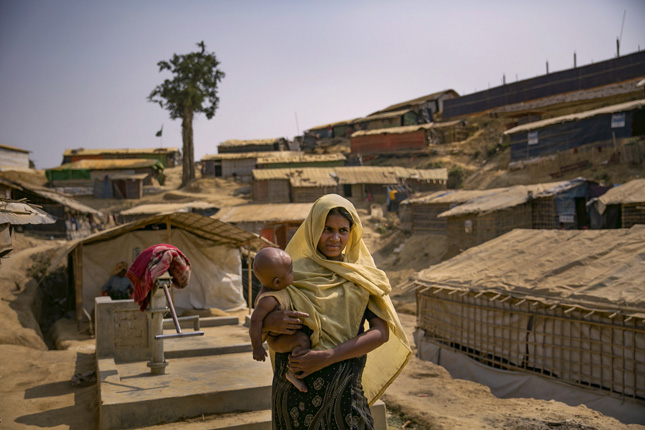Birth Behind Barricades: The Price of War on Maternal Wellbeing
Informational article by Kate Wilkins

War is often described in terms of the number of dead and the cost on the lives of the living. But one of the groups most impacted by the devastation of war is the unborn. For babies and their pregnant mothers, conflict wreaks havoc on their stability and health. For thousands of women, there is no choice but to give birth behind barricades.
While many people in the modern world don’t feel the direct effects of conflict, global violence is staggeringly high. Today, over 110 armed conflicts are happening in the world, ranging from South Sudan to Israel, to Russia, to Mozambique, and beyond. This is a result of the last few years being riddled with global conflict. In 2023 alone, there were “122,000 battle deaths, with over 71,000 people killed in Ukraine and some 23,000 killed in Gaza in less than three months. As of July 2024, the number of countries actively engaged in conflict is the highest it’s been since WWII. All this destruction has taken a massive toll. Steve Killelea, the founder of the Institute for Economics and Peace, remarked that:
“Over the past decade, peacefulness has declined in nine out of the ten years. We are witnessing a record number of conflicts, a rise in militarisation, and heightened international strategic competition. Conflict negatively affects the global economy, and business risk from conflict has never been higher, compounding the current global economic vulnerabilities.”
While it's true that war takes a major economic toll - as of 2023, the global economic impact of violence was $2,380 per person - often, an invisible cost of conflict is borne by the childbearing mothers. While it may not make the front pages, war-torn countries lack critical resources to support safe childbirth.
One of the underlying impacts of war is the damage to infrastructure - particularly healthcare infrastructure. Despite hospitals and healthcare facilities being granted protection under international war agreements, hospitals have been devastated in war in recent years. As of May 2024, of the “36 hospitals in Gaza, [only] four have not been damaged by munitions, raided by the Israel Defense Forces or gone out of service”. This has resulted in the loss of lives for both patients and doctors. Unfortunately, this problem is non-unique to the conflict in Gaza; as of 2024, “Ukraine's health care workers, facilities, and other medical infrastructure have been attacked at least 1,336 times” by Russian troops and offensives. For conflicts in developing countries like South Sudan, healthcare infrastructure was extremely limited to being with. This directly translates to the amount of healthcare resources available to be used for maternal and prenatal healthcare.
This lack of resources impacts thousands of women. Studies show that in 2022 alone, roughly 35 million women gave birth in conflict zones. Because of this, every single day, 500 women and girls die in these areas due to pregnancy and birth complications. This means that women living in conflict regions account for 1 out of 2 deaths during pregnancy. This statistic emphasizes how giving birth in war-torn regions causes thousands of otherwise preventable deaths. In Gaza,183 women give birth every single day despite an extreme lack of resources. Before the war, Gaza had over 70 health centers that provided pregnancy care and support. Those 70 health centers have now dwindled to 6. Lack of sanitary supplies, trained midwives and doctors, and other healthcare are quite literally the difference between life and death. The United Nations in December 2024 released a report stating that:
“Women, especially pregnant women, have suffered gravely. Many women have given birth with no or minimal pre- and post-natal care, increasing the risk of preventable maternal and child mortality. The UN Human Rights Office received reports that newborns had died because their mothers were unable to attend postnatal check-ups or reach medical facilities to give birth.”
This is an astonishing amount of mother and infant deaths. War takes an already vulnerable population and deprives them of resources that are critical to their survival. The cost of conflict on women puts their lives and the lives of their babies in jeopardy.
But it is not without hope. Many governments, NGOs, and nonprofits are committed to making an impact on this issue. The United Nations Population Fund has specifically raised money and provided resources to pregnant women in war zones. Because of their efforts, 1 million babies were safely delivered in humanitarian settings in 2023. Additionally, Project Hope is a non-profit focused on sending medical volunteers and trained doctors to displacement camps - also called tent settlements - that can provide this life-saving care. These organizations work tirelessly to help address a pressing problem with both resources and compassion.
For thousands of women, their birth stories are not filled with joy and celebration but fear and violence. Although many of their stories will go unheard, there is power in acknowledging how birth impacts these women and committing to being part of the solution.
